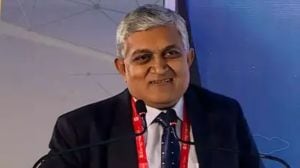The telecom regulator on Monday mandated mobile phone service providers to also offer recharge plans for voice and SMS services. Jatin Grover takes a look at the reasons behind the order & why operators want to bundle data in every pack
What has Trai mandated?
On Monday, the Telecom Regulatory Authority of India (Trai) notified the Telecom Consumers Protection (Twelfth Amendment) Regulations, 2024. Through the directions, the Trai mandated a separate special tariff voucher (STV) for voice and short messaging services (SMS) without bundling data in them. It said this would give consumers an option to pay only for the services they require. The order would especially benefit customer segments such as the elderly, those living in rural areas, and feature phone users. The Trai also asked mobile phone service operators to increase the cap on validity period for STV and CV (combo vouchers) from the existing 90 days to 365 days in line with validity of data-only vouchers, as this would benefit consumers from the hassles of frequent recharge. It also mandated retaining one top-up voucher of `10 denomination, while allowing telecom operators to offer vouchers in any denomination of their choice. It asked them to do away with colour coding of vouchers as it exists in the physical form, in view of the prominence of online recharges.
What was the reason for such a direction?
In July, the Trai released a consultation paper to review the Telecom Consumer Protection Regulations, 2012. Through the paper, it wanted to address the issues of choice of tariff availability, validity of vouchers, colour coding of vouchers, and denomination of vouchers. Directions have come as many consumers require only voice and SMS services. However, since recharge plans are bundled with data by telecom operators, it forces users to pay for additional services such as data which they don’t require. According to Trai, about 150 million subscribers continue to rely on feature phones for communication. This indicates an ongoing demand for voice and SMS-only plans, as these users primarily require basic telecommunication services – only voice and SMS. Separate plans for voice and SMS will also offer users their right to choice and will save them from spending unnecessarily. The regulator said the directions came after it received feedback from 41 stakeholders representing associations, telcos, individuals, and consumer advocacy groups.
Why telcos are against this
Telecom operators except for BSNL have opposed voice plus SMS-only packs. Private telcos have called the Trai direction ‘regressive’. According to them, separate voice-SMS vouchers would reverse data inclusion as it is critical for consumers today (like online recharges, UPI, etc.,) and in line with initiatives by the government such as the Digital India programme. Analysts said the rollout of voice and SMS-only packs would affect the average revenue per user (Arpu) of telecom operators as those packs will be affordable and many smartphone users who want to use only such plans would switch.
During the consultations, the Cellular Operators Association of India (COAI) said majority of customers — 91% — find telecom tariff plans to be within their budgets, ranging from somewhat affordable to very affordable. Further it said more than 90% of the customers send less than or equal to 1 SMS per day. The operators also said the move is likely to stall migration of users from feature phones to smartphones.
What consumer groups say
Consumer groups have discounted the arguments put forward by telecom operators. They say that older people are less inclined to use data services due to lack of knowledge, especially in rural areas. They said separate voice and SMS vouchers cater to users who prioritise voice communication, offering a cost-effective solution without data features. The same would simplify their choices and enhance user satisfaction. The move would also help secondary SIM card holders, who use the particular number for getting OTPs, Aadhaar verification, filing ITR, etc. For them, voice and SMS packs are only required and they would not have to unnecessarily pay for data.
For those exclusively using broadband at home, recharging for mobile data forces them to pay for services which are not needed. In fact, the regulator also noted that the recharge plans will not reverse the government initiative of data inclusion as service providers are at liberty to offer bundled offers and data-only vouchers. The only point here is that consumers are given choices.
International practices
In countries such as the US, Bangladesh and Pakistan, among others, telecom operators are offering voice-only and SMS-only packs to their subscribers. For example, Banglalink, a telecom service provider in Bangladesh, offers such plans. Grameenphone, another telecom service provider in Bangladesh also offers Voice-only and SMS only packs for different validity periods.
In the US, Tello, a telecom service provider, offers a tariff plan with custom choice of minute units and free SMS packs for their subscribers. Telenor, a leading telecom service provider in Pakistan, offers a variety of packages to meet diverse customer needs. These include voice-only and SMS-only plans, as well as an internet usage calculator on their website. The same enables users to select the most suitable plans based on their requirements, Trai said. Ufone, another telecom service provider in Pakistan offers tariffs for voice-only services, and combination of voice and SMS services.









